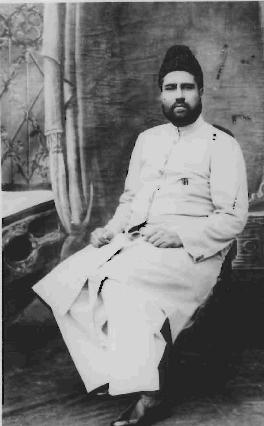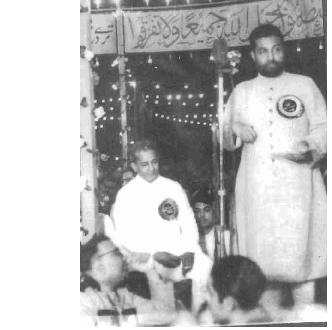By Mohammed Ayub Ali Khan
Nawab Bahadur Yar Jung (Bahadur Khan) (d.1944) , the towering leader of the pre-1948 Majlis-e-Ittehadul Muslimeen, has been the target of vehement attacks by his detractors to this day. He is routinely labeled as a communalist and divisive figure. In his heyday the Arya Samaj and other right wing organizations ran a well run campaign to defame his inspiring personality whose charismatic appeal crossed all boundaries of creed and caste. In one instance he was painted as a man-eating tiger devouring a Hindu man. Such false propaganda has led some modern day self described ‘enlightened’ & ‘intellectual’ Muslims to blame him for the contemporary communal problems in Hyderabad (Telangana) region of Andhra Pradesh. However, a careful reading of his life reveals that Bahadur Yar Jung was a bridge builder across communities who believed in harmonious relations with one and all.
 Bahadur Yar Jung was the product of the proverbial Ganga-Jamuni (or in this instance the Krishna/Godavari) culture. He opened his eyes in an environment where the Hindu-Muslim relations where at their peak with Maharaja Kishan Pershad, the prime minister, epitomized the syncretic culture of the time. Bahadur Yar Jung’s contact with the Maharaja began early—his father being a friend of the prime minister. His first direct encounter was recorded at a party at the Maharaja’s residence where he introduced himself as, ‘I am your student, Bahadur Khan.’ At first the former did not recognize him and asked for details.
Bahadur Yar Jung was the product of the proverbial Ganga-Jamuni (or in this instance the Krishna/Godavari) culture. He opened his eyes in an environment where the Hindu-Muslim relations where at their peak with Maharaja Kishan Pershad, the prime minister, epitomized the syncretic culture of the time. Bahadur Yar Jung’s contact with the Maharaja began early—his father being a friend of the prime minister. His first direct encounter was recorded at a party at the Maharaja’s residence where he introduced himself as, ‘I am your student, Bahadur Khan.’ At first the former did not recognize him and asked for details.
‘I have obtained knowledge by reading your books and energized Milad gatherings by memorizing your speeches,’ replied the young Bahadur Khan. When the Maharaja found out about his father he became even more attached to him and use to address him as ‘my son.’ As will be shown later the Maharaja was not the only Hindu to call him as such.
Bahadur Khan greatly respected the Maharaja and eagerly followed the Maharaja’s advice when there was a dispute within his family over ancestral property.
Sarojini Naidu was equally affectionate towards him and called him her son. She paid glowing tributes to him while introducing at a meeting held under the title, ‘ Mazhab Nahin Sikata Apas Mein Bair Rakhna.’ In response Nawab Bahadur Khan said, “I thank the respected chairperson for her introduction. But since I consider her to be my mother she has praised not me but herself.”
Bahadur Khan had ensured that Muslims not retaliate for the killings of his two close relatives in the infamous Dhoolpet riot of 1938. He successfully and single-handedly dispersed a crowd baying for blood. For this Sarojini Devi commented, ‘In a peaceful environment I have seen many leaders inflame the passions of the crowd…but I have neither seen nor heard of a speaker who could pacify the angers of an infuriated mob.’
Bahadur Khan counted many leading Hindu leaders as his friend including Gandhi Ji and Rabindranath Tagore. In a letter to Sarojini Naidu dated June 13, 1942, Gandhi Ji enquired about the deteriorating communal situation in Hyderabad:
“My dear Singer,
I had love letters from all of you three. But this is to draw your attention to the enclosed. I want you to show the note to your son and my friend the Nawab Bahadur Yar Jung. If the facts are as stated why should they happen where you and your son live?
Love to the family.
( Padmaja Naidu Papers, Nehru Memorial Museum and Library; Collected Works, Volume 94, page 99 )
At a memorial meeting held on the demise of Rabindranath Tagore he compared him with Allamah Iqbal and opined that the communal problem in India could easily be solved if the leadership is in the hands of leaders like the great poet.

There are various instances of Bahadur Khan’s life where he practically demonstrated his belief in justice and harmony. In 1942 he amicably resolved the dispute related to the land of Sharan Basappa Temple in Gulbarga. Finding Muslim claims to the land as unjust he gave the decision in favour of the temple. At this Muslims complained but he did not blink and instead reminded them of the Quranic verse, “… and do not let the enmity and hatred of some people lead you away from justice, but adhere to justice, for that is closer to piety.” (Qur’an, 5: 8).
Similarly, Bahadur Khan was also opposed to the formation of religion based trade or student unions saying that such divisions will be harmful for the collective interests of those classes or groups. In a letter dated 1 Feb., 1938 to Muhammad Afzal, a student of Usmania College, Warangal, he wrote that the proposed student union should not just be limited to Muslims alone and urged them to be open for students of all faiths and communities.
There are numerous such instances strewn throughout the brief but busy life of the great leader which his broad vision. He adopted his tough stance on the independence of Hyderabad because he was fearful of Hindu hegemony and its ill effects on the Muslims. Yes, he did envision an Islamic state but it was to be a state where non-Muslims would not be discriminated against. He said, “I emphatically assert that the Asafi Islamic State does not mean rule by the Muslims. By ‘Islamic State’ I mean the kind of government which is defined in God’s book as Islamic government. Islamic government means a government under which all communities live in peace and comfort and which is marked by its impartial dispensation of justice. I call a state an Islamic state wherein the rich do not harass the poor and the Government of which is just and fair.”
His conception of an Islamic state is far cry from the one elicited by the contemporary media. It was to be a pluralist state where the rights of one and all be respected and where peace prevails.
Despite his idealism Bahadur Khan was also practical and realistic. There are some indications to suggest that he knew that this kind of a state could not be realized in the given scenario. Mir Laiq Ali, the last prime minister of Hyderabad, is of the view that Bahadur Khan wanted to get the best possible deal for the Muslims and that had he been alive things would not have been as tragic or bloody as they eventually did due to the emotional leadership of Kassim Razwi.
But, alas, for all his concern for the Muslims a section of the community is indulging on defaming him and unwittingly carrying forward the propaganda of the pre-1948 Arya Samajis.

